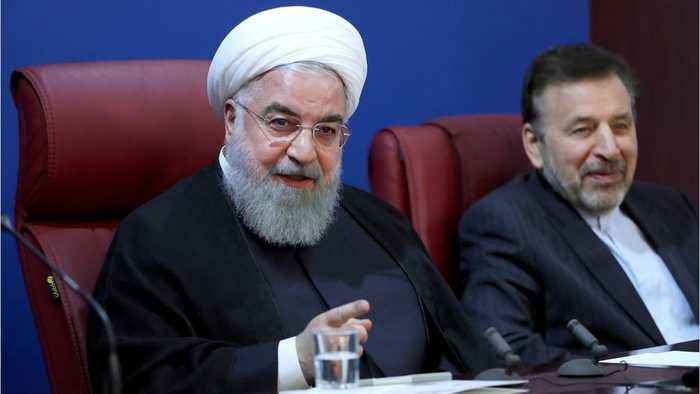Iranian President Hassan Rouhani addressing officials, Tehran, November 5, 2018
Iran’s regime responded with defiance as comprehensive US sanctions took effect on Monday, declaring that it is Washington rather than the Iranian economy which is failing.
President Hassan Rouhani led the firm response, telling directors and deputies of the Economy Ministry about a “war situation”:
We should break the sanctions very well, and we will do that.
With the help of the people, and the unity that exists in our society, we have to make the Americans understand that they must not use the language of force, pressure, and threats to speak to the great Iranian nation. They must be punished once and for all.
EA on Monocle 24: US Sanctions v. Iran
Rouhani did not specify the counter-measures that would “punish” the US. Instead, he distorted the US granting of waivers to eight countries as a failure at the first hurdle:
They saw that they couldn’t replace [Iranian oil]. And even assuming they did not concede defeat and did not grant waivers to countries, we would still be able to sell our oil [because] we have adequate capabilities to do that.
In fact, the US waivers — to Iran’s leading customers China, India, Japan, South Korea, and Turkey as well as to Italy, Greece, and Taiwan — are conditional on those customers cutting Iranian oil imports (in India’s case by 1/3) up to March, when the terms will be reviewed.
While the Trump Administration has set the public goal of a total cut-off of Iranian oil exports, they want to prevent a spike in the global price with an immediate, full stoppage.
With OPEC and Russia covering the 40% decline in Iranian exports since April — a drop of 1 million barrels per day — the price has been stable. The cost of Brent crude fell slightly on Monday to under $73 per barrel.
Despite the European Union being unable to provide guarantees for trade and investment — with large firms suspending links with Tehran — Rouhani continued his appeal to Europe: “Today, we are not the only ones who are angry at US policies; even European businesses and governments are angered by US policies, too.”
But the President’s approach was further damaged when the Guardian Council rejected a Parliamentary bill for Iran’s accession to an international convention against finance of terrorism. As part of negotiations with Iran over trade and investment links, the EU has sought the Islamic Republic’s inclusion in the Financial Action Task Force.
The Rouhani Government said Monday that it would seek a revised measure for accession.
US Secretary of State Mike Pompeo announcing the sanctions for “maximum pressure” on Iran
What Plans?
Economy Minister Farhad Dejpasand insisted Iran has “a serious plan” to counter the sanctions.
He said the details could not be set out, but indicated that it will include privatizing state assets to raise capital for development.
Dejpasand said the plans would also pursue good governance, mechanisms for improving the business environment, incentives to encourage investment, and projects to address unemployment.
Foreign Minister Mohammad Javad Zarif took a more conciliatory path, saying Tehran is open to talks about a new nuclear agreement if the Trump Administration changes its approach.
In an interview with USA Today, Zarif said Iran will consider diplomacy if there are “foundations for a fruitful dialogue” with “mutual respect”.
But speaking to Parliament, Zarif joined Rouhani in striking a tough pose: “Today, we can see, that, by the grace of God, the JCPOA [nuclear deal] was so much in favor of Iran’s interests that America withdrew from it scandalously.”

